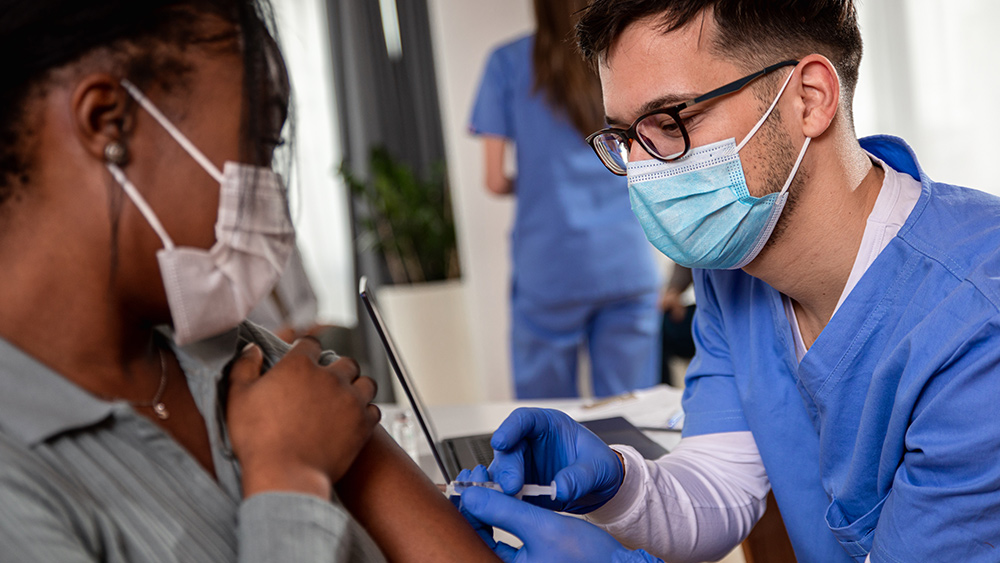
President Joe Biden last year reprimanded Americans who did not want to get Wuhan coronavirus (COVID-19) vaccines, saying they were to blame for a "pandemic of the unvaccinated." However, research data from around the world has proven that his claims are false.
Kaiser Permanente (KP), a well-known insurance company and healthcare provider, has commissioned a study to evaluate the effectiveness of the COVID-19 mRNA vaccine against the dominant omicron subvariants.
The KP study revealed that those who are triple-vaccinated are more likely to be infected with COVID-19. Shockingly, or maybe not, they were also more likely to suffer severe illness and die from coronavirus.
According to a report by investigative journalist Daniel Horowitz, one chart on page 30 of the KP preprint study found that vaccine efficacy against the omicron subvariants dropped significantly 14 to 30 days after vaccination.
The efficacy continues to fall in the following months until it reaches negative territory after five months. This suggests that the recipients are more likely to get coronavirus than the unvaccinated.
Additionally, the study results indicate that triple-vaccinated individuals are at greater risk of getting COVID-19 after five months than those who only received two vaccine doses. (Related: Study finds 84% increase in incidence of cardiac-related DEATH among men under 40 following mRNA vaccination.)
Horowitz, who has reported on the negative efficacy of the coronavirus vaccine for the past year, added that it's possible that the vaccines "prime the body to respond with a version of the virus that has long since changed, thereby making the natural immune response misfire."
Those who support COVID-19 vaccine mandates claim that this is the reason for the new bivalent shot for the BA.5 omicron variant that was approved after it was studied in only eight mice and no human volunteers, said Horowitz. But since a new variant is surging, the new shot is as irrelevant as the previous ones and may even be counterproductive.
The Centers for Disease Control and Prevention (CDC) reported that the new BA.4.6 variant now accounts for at least 13 percent of all COVID-19 cases and is rising sharply. Other variants also continue to spread.
Dr. Meryl Nass, an epidemiologist and internal physician, featured Horowitz's article on her Substack page. Nass wondered if the KP study was conducted because the company was worried about the excess illness it was seeing.
She said Kaiser "might be willing to do a little truth-telling" as the company tries to determine "who is going to pay for this unexpected hit, which presumably did not stop in 2021 but continues apace."
Adults who have received mRNA booster shots are twice as likely to be hospitalized
Meanwhile, British government data found that adults aged 40 to 74 who have received mRNA booster shots are twice as likely to be hospitalized as those who haven't been boosted.
In June, an analysis of the Pfizer and Moderna COVID-19 vaccine trials by British Medical Journal Editor Dr. Peter Doshi and other medical experts revealed that people who received the mRNA vaccines were more likely to be in the hospital than get protection "from a severe adverse event."
Still, Dr. Anthony Fauci has the gall to show up on "The Late Show with Stephen Colbert" on CBS earlier this October and promote the new bivalent booster with the host.
Fauci and Colbert taped a sketch where they left the studio and walked down the street to a pharmacy after Fauci said during an interview that he was eligible for another booster. While at a Walgreens store, Colbert joked with Fauci as the latter got vaccinated.
Funnily enough, Fauci still tested positive for coronavirus back in June despite already receiving four doses of Pfizer's COVID-19 vaccine.
Visit Vaccines.news for more information about the adverse effects linked to COVID-19 vaccines and booster shots.
Watch the video below to know more about Carlos Tejada, a New York Times writer who died of a heart attack one day after getting a COVID-19 booster.
This video is from The Prisoner channel on Brighteon.com.
More related stories:
About 800,000 American children missed school due to adverse reactions to COVID-19 vaccines.
Sources include:
Please contact us for more information.
















